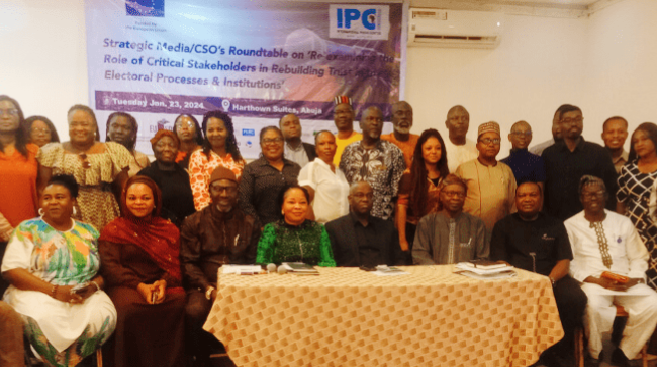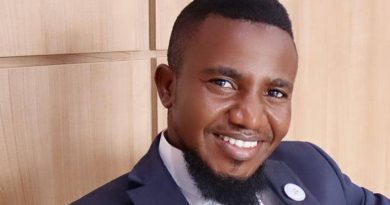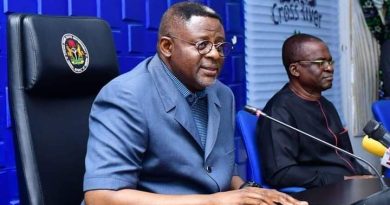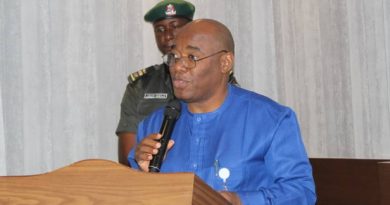TRUST IN ELECTORAL PROCESS: IPC Holds Media/CSOs interface and roundtable dialogue in Abuja.
Oru Leonard
The International Press Centre (IPC), Lagos-Nigeria, lead implementing partner of component 4 (Support to media) of the European Union Support to Democratic Governance in Nigeria-Phase 2 (EUSDGN II) project, on Tuesday held a one-day Media/CSOs interface and roundtable dialogue in Abuja.
The interface which was also to ‘re-examine the role of critical stakeholders in rebuilding trust in the electoral processes & institutions’, had a many media stakeholders and Civil Society Organisations (CSOS) as participants.
In his welcome address, tge IPC Executive Director, Mr. Lanre Arogundade urged Stakeholders to play roles expected of them for the country to have credible elections, which serve as the basis of public trust.
Arogundale said the question of whether the Media and Journalists have done enough to hold the government, the security and law enforcement agencies, the election management body-INEC, the political parties and the candidates, the civil society, the citizens, the observers and monitors accountable is one that should be honestly answered going forward.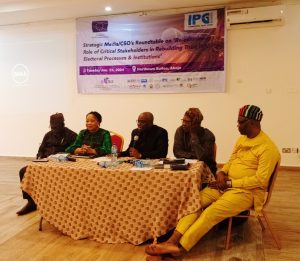
He also therefore called on the media and journalists to realize that they themselves are accountable and should be accountable to the society during the electoral processes and elections.
“Being non accountable can also affect the credibility of elections. Based on the provisions of the laws governing elections and the statutory and non-statutory regulatory frameworks, the accountability functions of the media include being factually accurate, avoiding biases, prejudices and hate speech; being conflict sensitive and refraining from being part of information disorder in this age of disinformation, misinformation and malinformation.
“The media and journalists are also accountable based on the agenda setting and social responsibility theories of the media, among others”, he buttressed.
Again, we may ask the question: whose agenda have the media been setting during the elections? Can we say, it is the public interest agenda?”, he stated.
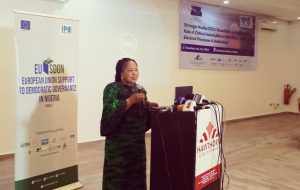 In her remark, the special guest, INEC’s Director, Publicity and Voter Education, Mrs Mary Nkem stressed that the Commission is always open to suggestions and collaboration that will enhance the electoral process in Nigeria.
In her remark, the special guest, INEC’s Director, Publicity and Voter Education, Mrs Mary Nkem stressed that the Commission is always open to suggestions and collaboration that will enhance the electoral process in Nigeria.
The Lead Speaker Mr. Jide Ojo, a Development consultant and Public Analyst, while making a presentation on the theme, noted that the objective of the retreat was to explore means of rebuilding public trust and galvanize the support of critical stakeholders especially the media and CSOs actors as partners with INEC in enhancing the credibility of the Commission through improved information and communication strategy.
Ojo stated that the credibility or otherwise of any election is dependent on 10 critical stakeholders which are; INEC and State Independent Electoral Commissions (SIECs), National Assembly, political parties, aspirants and candidates, judiciary, security agencies, electorates, civil society organization, media and development partners.
On the role of the CSO and Media in rebuilding citizens’ trust in INEC, Jide called on the two stakeholders to engage in conflict sensitive reporting of elections devoid of hate speech,fake news and undue sensationalism; Proper training of accredited observers and journalists on the electoral process and procedures is desirable; Fact-checking of INEC and citizens posts on social media (authentication and verification), before publishing for public consumption; Liaison with INEC Citizen Contact Centre and Voter Education and Publicity Department for authentic information on the activities of the Commission.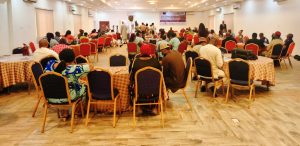
Speaking on INEC’s responsibility to rebuilding trust and confidence of citizens, he said, “Almost a year after the conduct of the last general elections, INEC is yet to make public information about arrests, investigations and prosecution of its staff that were alleged to be involved in compromising the integrity of the elections.
“Likewise, no further update has been given on INEC ad hoc staff caught with pre-filled result sheets during the November 11, 2023 governorship elections in Kogi State as well as those who posted results of Polling Units where elections did not hold on IREV in Imo State.
“Many Nigerians are at a loss on why the Commission did not invoke provision of section 65(1) of the E.A 2022 which empowers it to review results that were wrongfully declared”, he noted.
Mr Ojo called on the media and civil society organisations to assist INEC to bolster people’s trust and confidence in the electoral management body, adding that there is a need for a symbiotic relationship among the three institutions. He advised INEC to do a lot of house cleaning ahead of February 3, 2024 re-run and bye-election polls as well as future elections.
The meeting which was design to mitigate some of the negative perception by citizens (as documented from IPC media monitoring of 20 print/online media and INEC social media over the past one year). attracted leaders of Civil Society Organisations, editors and reporters from the print, broadcast and online media; the media professional bodies/associations; representatives of media regulatory bodies.

